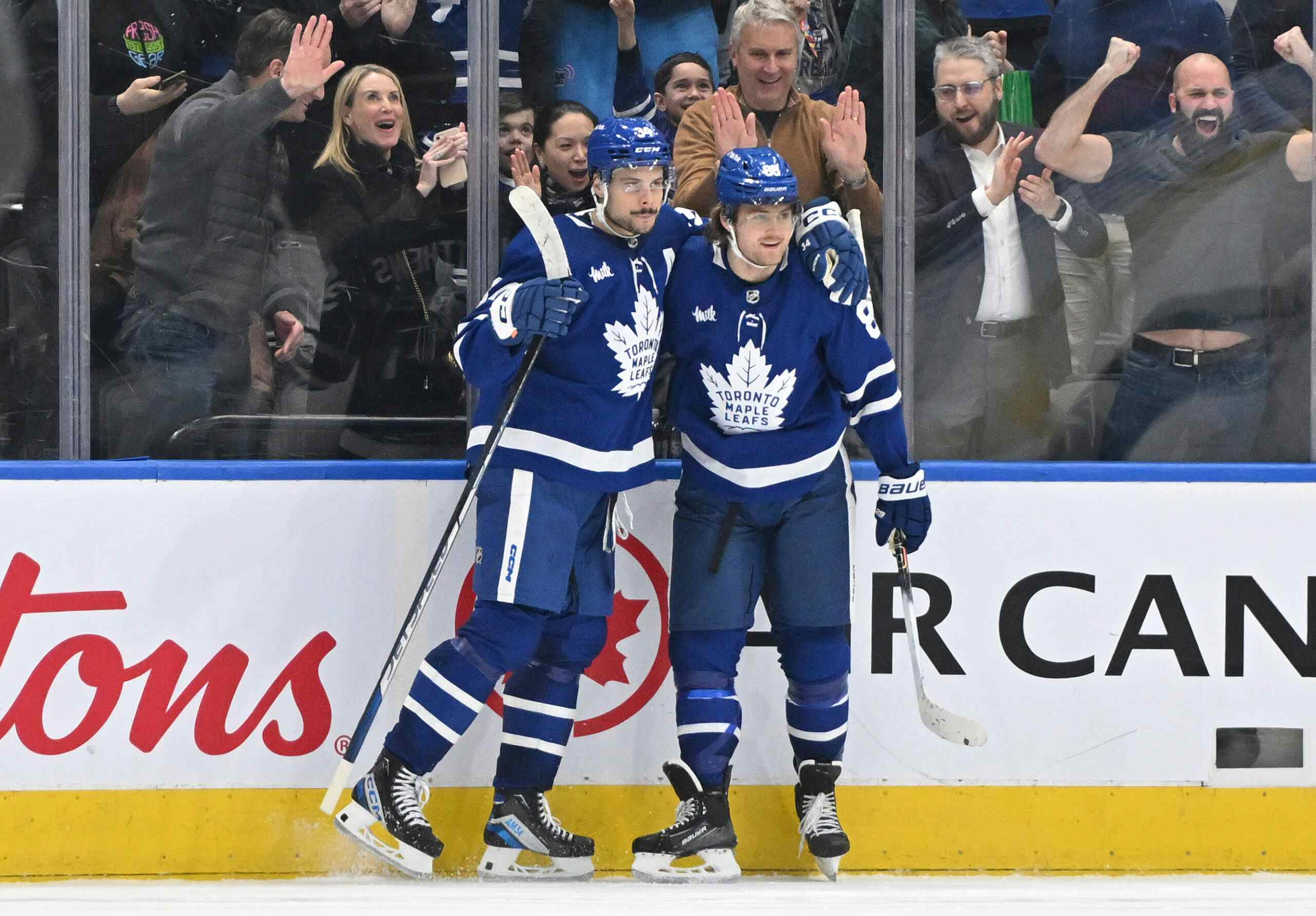The Tragically Hip, Hockey, The Leafs, And Us
By Greg Brady
7 years agoIt’s only May, and yet it’s been, to put it mildly, a terrible, awful, no-good, very bad year if you’re a music fan. Though over the Christmas season, the oft-troubled Scott Weiland from Stone Temple Pilots passed away while on tour, while the iconic Motorhead frontman Lemmy died of an “extremely aggressive cancer” just three days before New Year’s Eve. Maybe neither death was utterly unexpected. Weiland had off-and-on drug troubles for what seemed like two decades, and Lemmy had lived a very, very hard life with booze and pills, and cancer only enveloped and overwhelmed him without him having the strength or disposition to fight it much at that point.
But then January came, and the terrible hits to our memories, teen years and even the adult phase for some of us kept coming and walloping us. David Bowie on January 10th. Glenn Frey on January 17th. Maurice White. Phife Dawg. Last month, Prince may have hit the global community hardest of the bunch.
And then yesterday.
Gord Downie, lead singer of The Tragically Hip is only 53, and has inoperable brain cancer, and though we didn’t hear from him today, we soon will. In the forum in which Downie most enjoys sharing and speaking — the stage. In front of thousands. All across Canada, for one final time, and one last tour.
It’s crappy, crappy news in a crappy, crappy year for music fans, and THIS is certainly the one, if you’re Canadian that hits home — and yet, weirdly makes us thankful when our icons and influences of our culture and country — Anne Murray, Neil Young, Tom Cochrane, Leonard Cohen, Robbie Robertson, to name countless others, have all been with us as long as they have, and we can keep sharing them, and occasionally seeing them. That time, at least the “seeing” part will sooner than we ever would wish, will come to an end for Downie. From covering the NHL for years, and even before, you’d be hard pressed to name a band (some have tried, and some have known how hopeless the accomplishment is) that speaks more to Canadians, and for Canadians than the Hip do.
Some albums you can love, some you can like, and some you can leave; even their most ardent and committed fans acknowledge their catalogue has some perfect moments, and some less than. But isn’t that all of us? Good and bad days? Warm and cold moments? At the end of the day, all we’re aiming for is to be thoughtful, be somewhat provocative, and be interesting. I know that’s my goal in the business I’m in. Well-liked? Well, the Hip sure are, but hardly universally. Rip them in a public forum in any of ten provinces or three territories and you’ll have more against you than standing beside you defending you. There’s no other Canadian musical act that you can say that about, and there are so very many great ones. But where does hockey tie in? Well, all over the map. Given that the Hip have sold out every NHL arena in this country on more than occasion, it’s worth exploring the links between Canada’s national sport, and seemingly, Canada’s national band:
1. Explaining “Fifty Mission Cap” to an alien, or an American, or a Swede.
Without being wordy (look who we’re dealing with here), it’s a song from the band’s 1992 album, “Fully Completely” album. I wouldn’t say it’s the album that “broke” the band, because “Up To Here” two years earlier got a lot of attention. I still feel it’s most people’s “first” Hip album, but this was the release where we anticipated and tried to guess “what’s next”. Given it’s an album rich in Canadian history and context, it’s probably no surprise there’s a song about a hockey player, yes?
But what a player to pick, not a modern day one, and barely a household name in 1992, before you could easily “google” really Bill Barilko. The older Maple Leafs fans knew all about the story, but it was mostly new to the rest of us. Th set out the story of Barilko, weeks after scoring the 1951 Stanley Cup Final-clinching goal for the Maple Leafs, defeating the Montreal Canadiens, going missing along with a friend, while on a fishing trip, in a tiny single-engine airplane. This wasn’t exactly the CNN-era, but imagine a 24-year old three-time NHL all-star (a Cup winner from Toronto, no less!) going missing, and no one discovering either a body or the plane wreckage for eleven years. Barilko’s body and the plane wreckage were discovered in June 1962. The Maple Leafs had won that spring’s Stanley Cup Final in six games over Chicago, yet hadn’t won a single Cup Final while Barilko was missing. He’d have been 35 (and maybe still a Leaf) if not for that fatal accident.
For many years attending games at the Air Canada Centre, the house DJ played the song as the Maple Leafs hit the ice for the third period, and I do chuckle and wonder sometimes, “how motivating is this, truly?” It’s a pretty sad, mysterious song for a franchise that people joke about being cursed for nearly half a century now, but it’s the Hip, and apparently, the complaints are minimal.
2. Gord Downie and his Bruins: Oh, the mixed emotions from spring 2013
Downie recently saw his Boston Bruins win a slightly improbable Stanley Cup in 2011, after trailing Montreal 2-0 in the opening round, and famously, the Canucks, 2-0 in the Stanley Cup Final. He was eight years old at the time of Bobby Orr’s overtime winner in 1972, and 47 for this victory. Former Bruins GM Harry Sinden happens to be Downie’s godfather, and the Bruins have been cheered for in his family by various uncles and brothers, and aunts for decades. He went along with it, yet says growing up in Kingston, the Leafs will always be special to him, too.
3. Yes, there were other hockey references!
Sure, though this one means many different things to many different people, “The Lonely End Of The Rink” could be a love song, a breakup song, or a song paying homage to winter and or hockey (indoors or outdoors). You can find lyrical references to sweet dekes, a frozen lake, snowy gloom, and my favourite, “Oh to join the rush, as the season builds”. CBC’s Hockey Night in Canada brilliantly used the song as their opening montage for the 2006-07 NHL season.
If somehow, it’s slipped past you, too, you’ll like “Fireworks” off the 1998 Phantom Power disc. There are lots of references to Bobby Orr and the 1972 Summit Series. I was too young for it, but I know even from the Miracle On Ice in 1980 how a nation can become transfixed and uplifted by hockey, and the song’s a great indicator of that.
4. The Hip pay tribute to an innocent kid who just wanted to live his NHL dream.
Dan Snyder lost his life in a single-car accident just as he was about to start the 2003-04 season with the Atlanta Thrashers. This was to be his breakthrough moment, an undrafted OHLer who played his career in Owen Sound with the Platers, and who’d scored ten goals in a 36-game call-up period with the Thrashers the prior season. At age 25, with a one-way contract, the world was his oyster, until that tragic night. A car driven by star teammate Dany Heatley went out of control in a residential area, jumped a curb, and hit an iron fence. Snyder was comatose and never recovered, dying six days later.
Several months later, the Hip needing a few more songs for their “In Between Evolution” album, wrote and recorded “Heaven Is A Better Place Today.” It led off the album, both as a tribute to Snyder, as much as it was a tribute to American men being forced into combat with the ongoing American invasion of Iraq.
5. No one better than the Hip to celebrate Olympic Hockey glory.
In 2002, though they were up against recording deadlines to get “In Violet Light” ready and eventually shipped to their record label, they broke away from sessions for it to get to Salt Lake City during the 2002 Winter Olympics. After a heartbreaking collapse in Nagano against the USA women for gold, Canada got their revenge on the Americans’ home ice, and the Hip were there to help them celebrate with an outdoor show kicking off with “Fireworks”. Whether it’s the Hip’s winning karma or what, the Canadian women haven’t lost an Olympic Gold Medal match since, winners of four straight and counting.
6. The Hip love their NHL arenas.
Yeah, they do. Eventually, clubs and theatres wouldn’t hold the Hip’s multiplying legion of fans, and though “Fully Completely” was still months away from release, the Hip booked two pre-Christmas shows in 1991 at Maple Leaf Gardens. They sold them both out, incredible given “Road Apples” had been out for eleven months at that point, and they were debuting “Fully Completely” songs that their audience had never heard before. Their debut song at MLG was “Three Pistols” and they performed an 18-song set ending with a three-song encore of “Long Time Running”, “On The Verge”, and “The Luxury”.
7. And they cracked the Air Canada Centre open too, like a fresh bottle of Molson Canadian.
The Air Canada Centre was long overdue, despite what any patron of Maple Leaf Gardens, be it once or a thousand times, would tell you about the history and unique vibe it had. It allowed for more Maple Leafs fans to experience their beloved franchise in person. It allowed for the Raptors to get out of cavernous SkyDome and play in a real built-for-NBA arena. But almost as important, given the huge concert town Toronto is, it needed better acoustics, great angles, and when a band turned it up to 11, you wanted to hear it all.
The Hip provided that two nights after the first Leafs game, a 3-2 OT win thanks to extra-time heroics from Steve Thomas. On the first of two sold-out nights, the Hip started a full-on arena tour of Canada by launching into “Something On” and “Fifty Mission Cap”. They concluded with “Grace, Too” and “New Orleans Is Sinking”, which though for many was the first Hip song we may have heard on the radio, wasn’t a guaranteed play on tour every night given the library the Hip were assembling. Fantastic night. A little like the Doug Gilmour goal against St. Louis or the Joe Carter home run, I’m sure you can find 90,000 people in Toronto who claim they were there to see the Hip christen what’s still one of the busiest concert venues in North America.
Well, these pleasant recollections and moments from a nearly thirty-year career of rock and roll are a modest distraction from reality. The Hip will be heading out on the road. No, I can’t help you get tickets, and yes, I want to go too, though I haven’t seen them in an arena setting since the “Day For Night” album. But for what Gord Downie has meant to a vast and expansive, yet, at times seemingly tiny and quiet nation, this is the tour we don’t want, and won’t be able to accept for a while. That’s because it’s not the bridge to another, and another, and another; it’s almost certainly the last. Truthfully, we’re not ready for there to be a last Tragically Hip moment. Brace yourselves; none of this will be easy.
Recent articles from Greg Brady





